Uncategorized

Posted on
March 20, 2020
3 Min. Read
Author
Purple Strategies
She Has a Reputation: Honoring the women of Purple during Women’s History Month
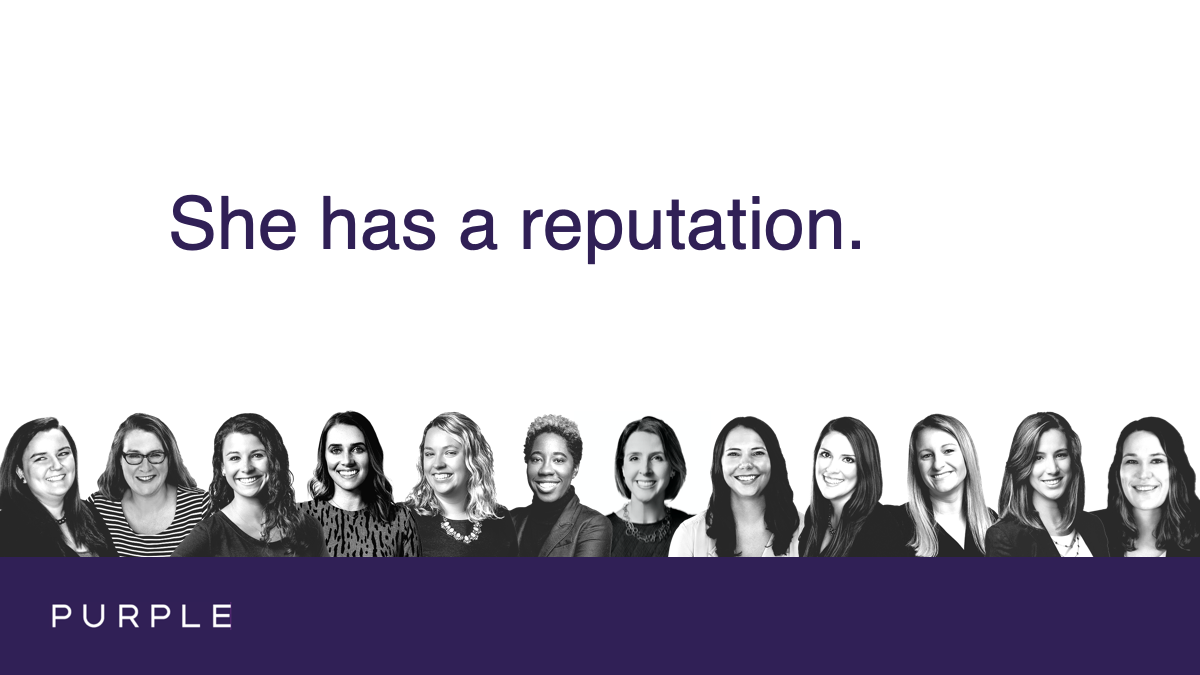
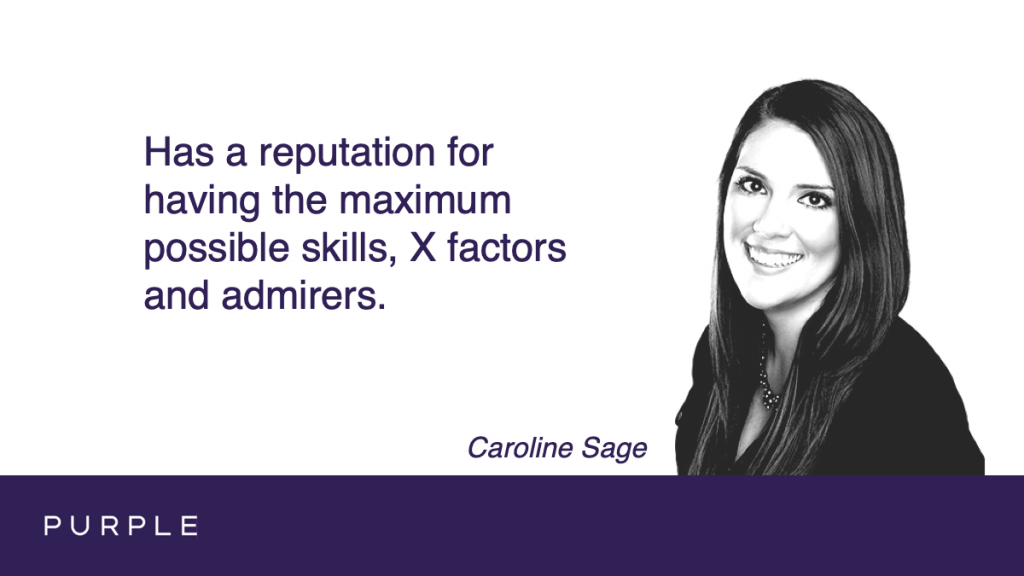
Her extreme skill at drilling down deep to understand the most challenging issues facing clients is just the beginning. Purple people can’t say enough about Caroline Sage.

An experienced researcher, field organizer, political campaigner and corporate strategist, Chinasa Onukwubiri brings lessons from her work around the globe to clients and causes.

Building on earlier work in politics and campaigns, Crystal Benton develops strategies to enhance and protect reputation, influence policy debates, and drive business growth. Serving strategy always.

As MD of Insights Operations, Denise Brien leads teams in the design and implementation of research that delivers the powerful insights behind countless successful client campaigns. And those teams love her.

Our Diana Muggeridge is a campaign strategist who’s passionate about helping industry-leading organizations navigate challenges impacting their license to operate. Our team is passionate about how great she is.

There are few people as Purple as Elizabeth Emanuel. This near-lifer has held just about every role someone can hold at our firm – and done so fearlessly – and we’re grateful she chooses to call Purple home.

A former boss of Katie Pudwill once described her as the walking, talking embodiment of “North Dakota nice.” It was true when she was in politics and journalism, and it’s true today in her work with Purple. Love.

With broad issue-advocacy experience spanning agribusiness, energy and human rights, Keeley Hanlon has worked across the aisle to make the business case for social change. We see it as a bit of magic.

The brilliant Nicki Zink brings a uniquely valuable perspective, drawn from prior experience working in the non-profit sector and political journalism. The headline here is that Nicki is the best.

At Purple, Savannah Bailey works closely with clients to develop and execute campaigns to manage high-pressure issues. It’s why her ability to stay cool, calm and collected stands out.

A political polling expert and strategist who grew up in campaigns, Sarah Simmons learned how to relentlessly work a problem. Anything can be solved. That energy fuels the people around her.

Before navigating complex challenges for clients in industries from energy to education and labor to logistics, Tara Andersen dives into the research with glee. No wonder everyone wants her on their team.

Posted on
March 12, 2020
1 Min. Read
Author
Rory Cooper
Reputation and the Coronavirus
Purple’s Rory Cooper recently authored a client memo with observations, context and recommendations on building and protecting reputation amidst the global spread of the Coronavirus that was mentioned in the March 12, 2020 edition of POLITICO Influence.
To request a copy of the memo or learn more about Purple’s experience helping clients navigate complex issues, email: rory.cooper@purplestrategies.com
From POLITICO Influence, March 12, 2020.
MORE CORONAVIRUS MEMOS: As more and more Americans stay home from work due to the coronavirus, Washington consultants are still at work, drafting memos to clients on how they should respond to the pandemic. “Companies shouldn’t feel compelled to immediately change their prices, services or policies, but should be compelled to review them and review them again periodically,” Rory Cooper of Purple Strategies wrote in a memo to clients on Wednesday. “Are there business plans in place that are perfectly normal in a routine environment but could be seen in a different light amidst a pandemic?”
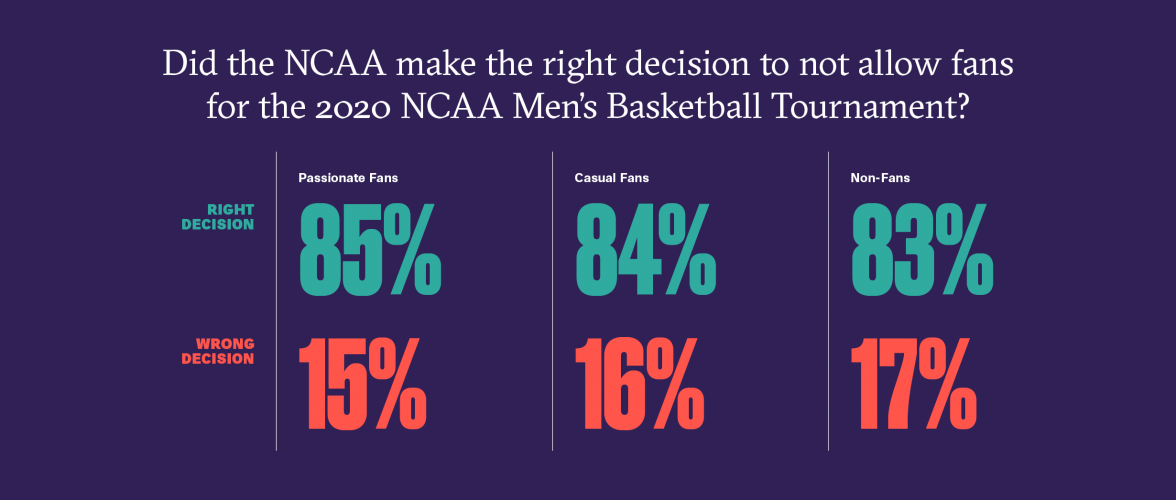
Posted on
March 12, 2020
1 Min. Read
Author
Bradley Engle
Overwhelming support for NCAA’s decision to not allow fans for 2020 March Madness
As a huge college basketball fan on a six-year streak of going to the Final Four, I’m disappointed that there will be no fans in the crowd for March Madness, but it was the right call.
And Americans agree. A Purple Pulse Poll found 84% of the informed public believe the NCAA’s decision to close arenas to fans was the right one.
And among the most passionate March Madness fans, 43% said they would be even more likely to watch games. Only 8% said it would cause them to watch less.
The decision to prioritize player and public health is likely to give the NCAA a much needed boost to its reputation, which has been under fire for years. Among those who regularly follow sports news, 52% believe the NCAA would do anything to maintain its power even if it meant harming student athletes (compared to only 21% who believe they would sacrifice power for the good of student athletes). But making this difficult decision around their marquee event will likely serve as powerful evidence of their commitment to student athletes, with the March Madness decision leading sports fans to a 62% favorable/11% unfavorable view of the NCAA.
Purple Pulse Survey of the Informed Public. N=1,000. March 11-12.
For more information please contact: bradley.engle@purplestrategies.com

Posted on
January 24, 2020
2 Min. Read
Author
Purple Strategies
Purple Welcomes Rebecca Ballard to Help Lead Communications, Marketing and Employee Engagement
Purple Strategies, a leading strategy and reputation management firm, has welcomed award-winning communications and organizational culture leader Rebecca Ballard as managing director, communications, marketing and engagement. In the newly created role, Ballard will build out and lead internal and external communications on behalf of the firm as it begins its second decade helping some of the world’s most important organizations address their most important challenges and opportunities.
“Rebecca’s deep experience partnering with both client- and agency-side leaders through times of growth and change will be an invaluable asset for us at Purple as we start on our next 10 years,” said Kristen Morgante, partner and COO at Purple. “Her work at the intersection of communications, strategy and talent is very much aligned with the Purple culture and approach, and we’re thrilled to welcome her to the team.”
Ballard began her career at Public Strategies, a business advisory firm specializing in public affairs, crisis management and public opinion research. Her work with the firm for nearly a decade covered a broad spectrum of industry sectors, including automotive, retail, manufacturing, health care, energy, and financial and professional services. In 2011 when the firm merged with Hill+Knowlton Strategies, a global communications consultancy and public relations network, Ballard took on a series of roles leading communications for the agency and developing its people and culture. Most recently, Ballard was head of communication and culture for H+K U.S. and founder and executive director of the firm’s women’s network.
Ballard was named to the PRWeek 40 Under 40 class in 2014, and in 2016 was named to the inaugural class of the PR News Diversity in PR Individuals of the Year. In 2018 Ballard was elected to serve as co-chair of the PR Council’s “PRC Next” shadow board of directors of next-generation industry leaders.
“I’ve watched through the years as Purple has built a reputation for being both a true strategic partner to clients in times of immense change, as well as a great place for great people to work, so I couldn’t be more excited about the opportunity to contribute to what’s next for Purple,” Ballard said.
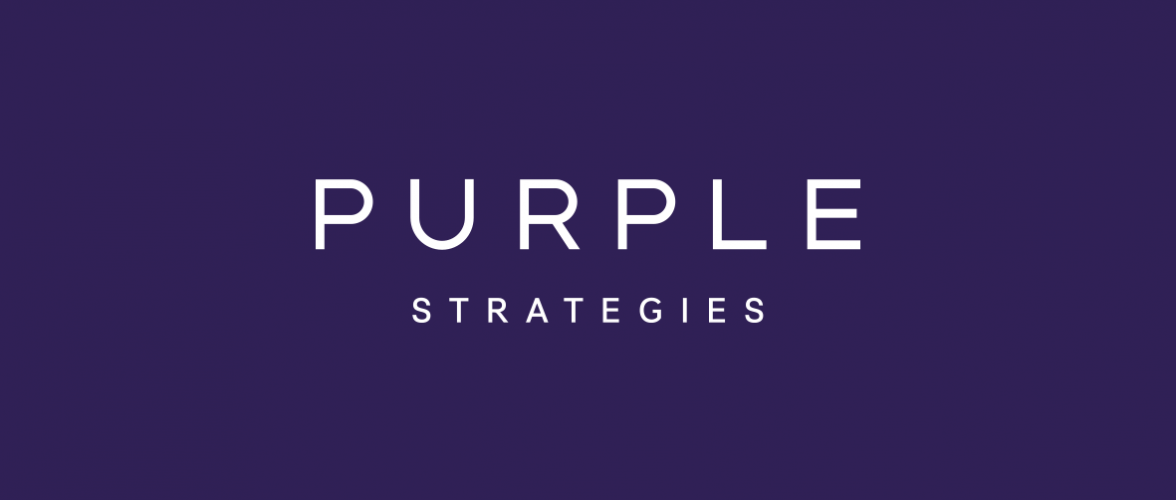
Posted on
December 19, 2019
2 Min. Read
Author
Purple Strategies
Purple Promotes Chris Durlak to Partner
WASHINGTON and CHICAGO, Dec. 19, 2019 — Purple Strategies, a leading strategy and reputation management firm with offices in Alexandria, Virginia and Chicago, Illinois has made Chris Durlak a partner. Durlak joined Purple as the firm was founded and was previously a media strategist with McMahon Squier & Associates before it joined with Alex Castellanos to form Purple.
“Chris truly embodies the very best of Purple,” said Steve McMahon, CEO and Co-Founder of Purple. “He is a gifted strategist and trusted client counselor who has proven himself to be an indispensable and in-demand partner to some of the most valuable companies in the world as they tackle incredibly complex reputation and advocacy challenges.”
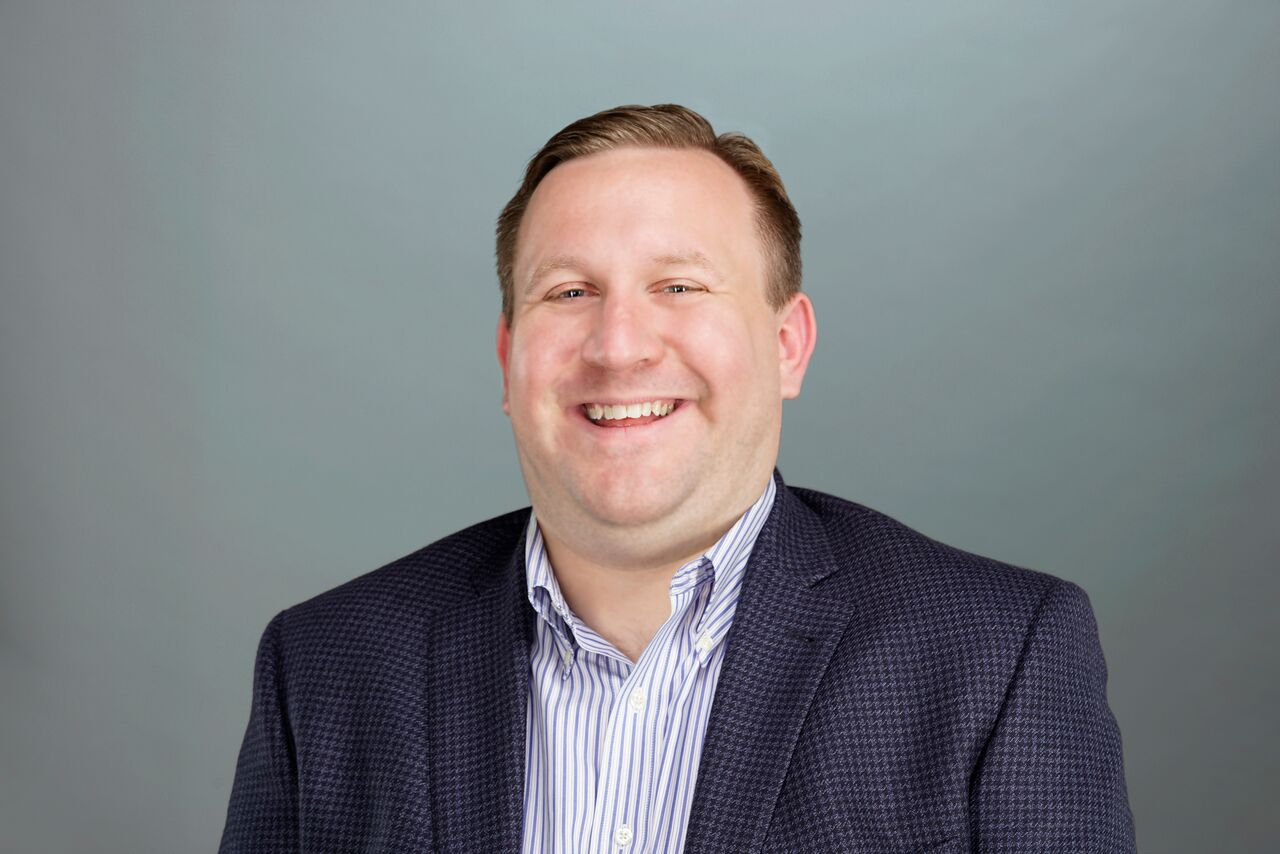
Durlak has advised senior corporate and communications leaders at companies in the U.S. and globally, across categories that include energy, consumer packaged goods, health care, pharmaceutical, sports and gaming, food and beverage, financial services, defense and aviation, trade associations, and nonprofits. He also serves on the Board of Trustees for the George Mason University Foundation, which administers private gifts made in support of the University.
“What sets Chris apart is not only what he does – which is lead clients to be the best version of themselves as they manage their reputation, but how he does it – with a spirit of generosity and a humility that is rare today. As Chris has grown at Purple, he’s been a driving force in growing others, always paying it forward and bringing his team members along,” shared Alex Castellanos, Chairman and Co-Founder of Purple.
Durlak’s elevation to partner comes as the firm marks its 10th year in business working with Fortune 500 companies and large industry associations on brand reputation and issue advocacy campaigns. Purple has been a longtime partner to clients like BP, McDonald’s, Coca-Cola and PhRMA. In addition to McMahon and Castellanos, Durlak joins a partnership that includes Mark Squier, a founding partner; Kristen Morgante, the firm’s Chief Operating Officer; Jillayne Smyth Rogers, the firm’s Chief Creative Officer; and John Gatti, who leads Purple’s Chicago office.
“I’m honored and humbled by the opportunity to become a partner,” said Durlak. “Steve McMahon, Alex Castellanos and Mark Squier have been incredible mentors to me. Purple is a one-of-a-kind place that continues to do groundbreaking work in corporate reputation. I look forward to continuing to find new and innovative ways to serve our clients.”
PR Newswire: https://www.prnewswire.com/news-releases/purple-strategies-promotes-chris-durlak-to-partner-300977284.html
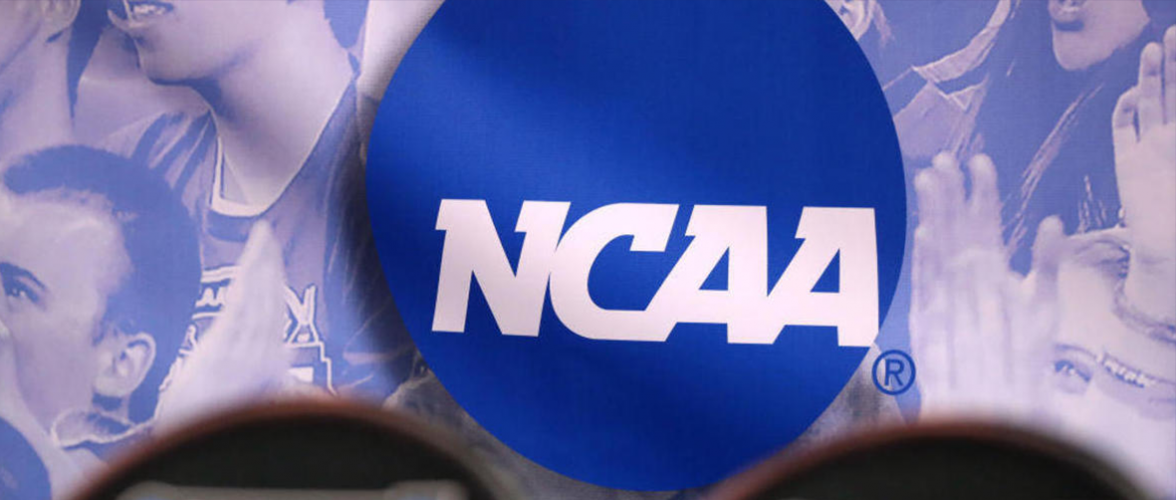
Posted on
November 10, 2019
2 Min. Read
Author
Purple Strategies
New Poll from Purple Strategies Shows California’s Fair Pay to Play Act Calls in to Question NCAA’s Ability to Fulfill Its Mission and Purpose
Leading reputation strategy firm’s survey points to belief the NCAA puts its own interests ahead of student athletes.
WASHINGTON, D.C. (Nov. 10) – New research from Purple Strategies, a leading reputation management and advocacy firm, indicates the NCAA – despite its recent decision to allow athletes to profit from their name, image and likeness – remains vulnerable to criticism it won’t do what’s best for student athletes. Purple’s findings are drawn from a poll conducted October 5-6, 2019, with 1,008 members of the informed public (defined as adults 18+ who follow the news regularly) in the U.S.
Among the most troubling findings for the NCAA, 59% of those aware of the California legislation believe the NCAA will do anything to maintain its power, even if it means hurting student athletes. That is 36 points higher than those who believe that the NCAA would sacrifice its own power for the good of student athletes, and nearly double compared to those who aren’t familiar with the legislation.
“Once there is perceived evidence that an organization’s motives no longer align with its mission, we often see a rapid decline in the public seeing that organization as indispensable. While the NCAA has taken a positive first step in indicating it is open to change, the findings in our study points to a perceived willingness on the part of the NCAA to put its own power over the good of student athletes,” said Robert Fronk, Managing Director of Reputation Strategy at Purple.
Today, people hold institutions to higher standards, and they expect no less from companies and organizations than from individuals. They require that actions match words, and if an organization is not perceived as part of the solution, it can be cast as part of the problem. Purple’s polling indicates the NCAA finds itself facing exactly that kind of public opinion challenge: those aware of the California legislation see the NCAA as part of the problem (49%) rather than the solution to issues facing college athletics (32%).
On the topic of paying collegiate athletes, Purple’s findings showed the informed public favors paying them (55% strongly/somewhat agree college players should be paid, versus 36% who strongly/somewhat disagree), though the gap narrows among those who feel most strongly: 26% strongly agree college players should be paid; 19% strongly disagree that collegiate athletes should be paid. These data suggest opinions can still move on the topic of paying college athletes.
“Whether student athletes should be paid is still very much an open debate, but people don’t believe the NCAA is a credible voice in finding the best path forward,” said Denise Brien, Managing Director of Insight Operations at Purple, “And while the NCAA has signaled its support for changes, it’s still unclear what those actions in support of student athletes will be.”
The NCAA has withstood headwinds in the past partly because people couldn’t imagine a future without them. The California legislation, along with that proposed in other states, has the potential to be a serious turning point, with more people thinking the NCAA’s best days are behind them than ahead of them.
“When people question the purpose of any brand or organization, as they are here with the NCAA, you can’t just tell your story differently or louder. You need to change the way you do business,” noted Brien. “Beyond saying it is embracing change, the NCAA will need to make decisions that fundamentally alter how it does business or risk further public opinion backlash and potential action from the nation’s policymakers.”


Posted on
November 7, 2019
1 Min. Read
Author
Purple Strategies
Purple Reputation Experts Quoted in Washington Post Column on NCAA
Purple reputation experts Robert Fronk and Mark Squier were quoted in a Washington Post column by Sally Jenkins on Nov. 7, 2019. Excerpts are shared below, but to read the full column click here. [Subscription may be required]
The NCAA is an entity that has to be restrained by threat of law from abusing athletes’ rights to their own names and likenesses and that reforms only hedgingly, grudgingly and deceitfully. It’s a body that has become so universally offensive to the nose that even politicians on the opposite poles have formed a consensus against it. Liberal California Gov. Gavin Newsom, conservative Gov. Ron DeSantis of Florida and moderate Republican senator Mitt Romney of Utah are all championing state and federal legislation to curb its maltreatment of athletes.
That rare political harmony is the subject of curiosity to the founders of Purple Strategies, a prominent bipartisan reputation-management and communications firm, who see raw indicators of strong anti-NCAA sentiment and broad support for athlete-protection laws that are sweeping the country. The leaders of Purple are veterans of red and blue political campaigns, such as Alex Castellanos, who worked on campaigns for former president George W. Bush, and Mark Squier, who advised former presidential candidate Howard Dean and former Texas governor Ann Richards. I asked Squier what he would say if the NCAA was one of his political candidates.
“I’d say they were underwater,” he said.
If the public perceives the NCAA to be acting in opposition to its stated purpose — economically preying on athletes rather protecting them — “that’s a very precarious position for any organization and its brand,” Squier says. According to Purple’s managing director of reputation strategy, Robert Fronk, once the public suspects an organization’s motives don’t align with its mission, “we often see a rapid decline in the public seeing that organization as indispensable.”

Posted on
October 29, 2019
2 Min. Read
Author
Nicki Zink
Using Integrated Insights to Drive Client Strategies: Takeaways from our NetBase Live Presentation
NetBase, a category leading social analytics platform, took over the Intercontinental in downtown Los Angeles to host a summit focused on the next era of social analytics.
The two-day conference was packed with sessions and demos featuring major brands, agencies and industry experts. Plus, to cap off the event, NetBase experts provided training on how to best use the tool for users at all levels, from introductory to master.
At Purple, we believe integrated insights will be a big part of what’s next for social listening analytics. This was the topic of our presentation at the conference.
Since you couldn’t join us in LA, here are some key takeaways from our presentation.
It turns out a retweet really doesn’t equal an endorsement.
“Retweet doesn’t equal endorsement,” may be a popular Twitter bio disclaimer, but the concept has merit. What people post on the popular social network is often not a real endorsement of an idea or content in a tweet. So how can you fill in the gaps? One data source we frequently combine with social listening research is search data. We’ve found in our campaign work that search is often a powerful predictor for when a topic or issue is truly starting to resonate. By combing these two methodologies were able to get a better understanding of whether or not social conversations are causing people to take more action than a simple retweet and learning more about an issue
What people read and what people post online are often different.
Many people are guilty of retweeting a story with a flashy headline without ever opening the link. Even if someone clicks the link on a media article, it’s not always true that they read every word in it. By pairing social listening with media analysis, you can make up for the gaps in both data sets, and determine if the media narrative, beyond headline sharing, is influencing conversations on social media.
Understanding what your customers are saying on social, not what everyone is saying, is a critical nuance.
In no other part of a marketing organization is more time spent on people that don’t matter to a specific cause or brand than in social listening. When you flip from analyzing every post, no matter the author, to analyzing what relevant groups of people are saying, you can unlock the true power of social listening. This is an important tool today especially as more companies look to take political stances on issues. Distinguishing what reporters, politicians, brand enthusiasts are saying online can help you determine what is resonating with your target audience.
Connecting social conversations with changes in opinions and beliefs powers insights that are valuable at the c-suite level.
From millions of impressions to a tweet authored by a high-profile user, in social listening, it’s easy to get distracted by something that is interesting. The real value you can provide to stakeholders at the highest level of an organization is when you connect this data with opinion data. This allows you to truly understand when a high-volume online conversation is translating to shifts in beliefs, and helps you provide strategic guidance on whether to act or not on an issue.
Go here to learn more about the conference, including the detailed agenda and list of speakers.
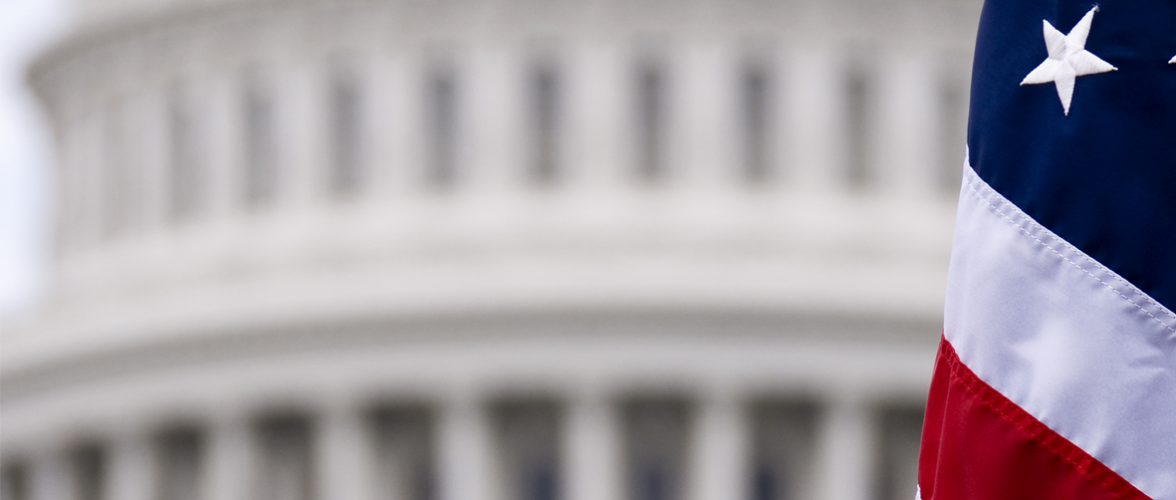
Posted on
September 18, 2019
1 Min. Read
Author
Purple Strategies
Purple’s Mark Squier Talks Campaigns With New Hampshire Public Radio’s Civics 101 Podcast
Purple Founding Partner, Mark Squier, sat down with Hannah McCarthy and Nick Capodice, co-hosts of New Hampshire Public Radio’s Civics 101 Podcast, to share his experiences in presidential campaigns as part of Civics 101’s limited series: How to Run for President. Check it out!
Link: New Hampshire Public Radio Civics 101 Podcast: How to Run for President
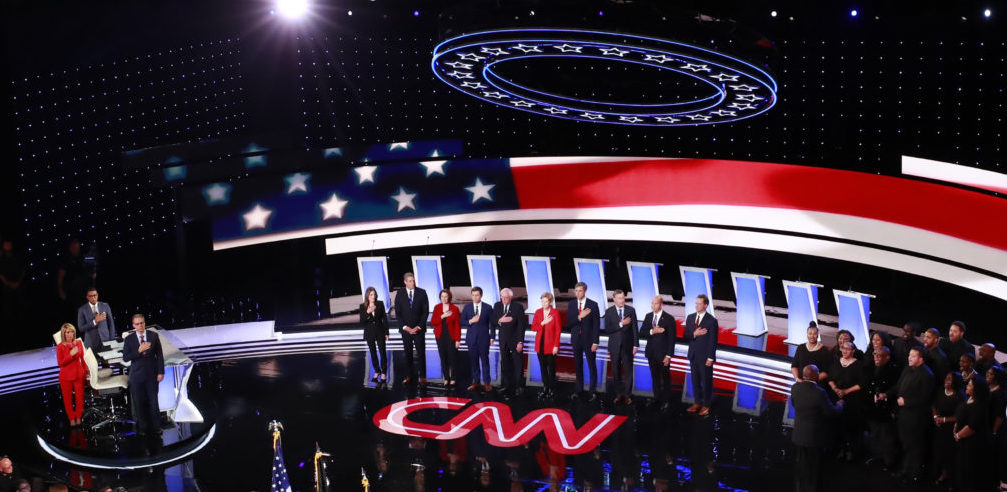
Posted on
August 1, 2019
3 Min. Read
Author
Purple Strategies
Purple Analysis: What was said at the Detroit 2020 Democratic Presidential Debate
20 Democratic presidential candidates traveled to Detroit, Michigan for the second primary debates on July 30 and 31st. While much of the media reporting and online conversation in the aftermath focused on the biggest winners and losers of the night(s), we took a slightly different approach to understand the impact of the debates.
Utilizing Quid, a natural language processing tool, we produced a graphical representation of what was said by each candidate and moderator at the debates in the Motor City. By focusing on what was said by each candidate, we’re able to glean insight into key topics and how they’re connected.
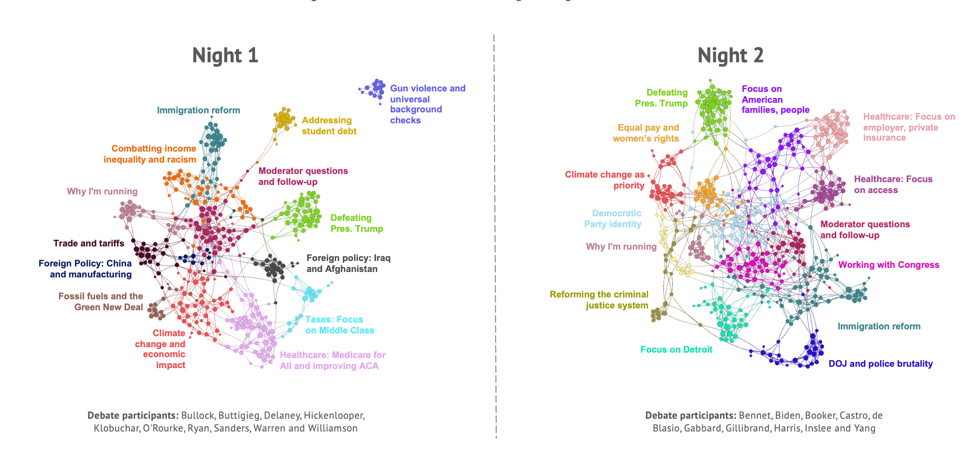
With a wide field, and still 462 days until Election Day, candidates spent a lot of time defining themselves and how they would lead the Democratic Party while on the debate stage.
Although news coverage speculated that the economy would account for a majority of discussion in Detroit, it actually took a backseat to another prominent issue, healthcare. On night one of the debates, which included Montana Gov. Steve Bullock, South Bend, Indiana, Mayor Pete Buttigieg, former Rep. John Delaney (D-MD), former Colorado Gov. John Hickenlooper, former Colorado Gov. John Hickenlooper, former Rep. Beto O’Rourke (D-TX), Rep. Tim Ryan (D-OH), Sen. Bernie Sanders (I-VT), Sen. Elizabeth Warren (D-MA) and activist Marianne Williamson, healthcare was mentioned in over 21% of statements. A driving force of this topic was frontrunner Bernie Sanders’ Medicare for All proposal, which moderators not only asked Sanders himself to defend, but also posed questions to the Vermont senator’s competition about their stance on his signature healthcare proposal.
Another reason behind the prominence of healthcare both nights of the debates at the Fox Theater were critiques of the healthcare industry as a whole. “What I don’t believe is that the profit motive of big pharma or big insurance companies should ever determine, in our great nation, whether somebody gets healthcare or not,” Obama’s former housing secretary Julian Castro said on night two of the debates.
This criticism of industries for their greed was not just specific to the healthcare or Big Pharma, Wall Street, the fossil fuel industry and generic corporations also came under attack by candidates. But these attacks were kept broad and did not zero into specific companies or corporations by name. In fact, less than 1% of overall statements from each night of the debate mentioned a specific company by name.

 Brad Dayspring Joins Purple Strategies as Executive Director
Brad Dayspring Joins Purple Strategies as Executive Director  Celebrating Growth and Leadership at Purple
Celebrating Growth and Leadership at Purple  Has the narrative lost the story?
Has the narrative lost the story?  Caught in the Middle: What Immigration Policy Means for Busi...
Caught in the Middle: What Immigration Policy Means for Busi...